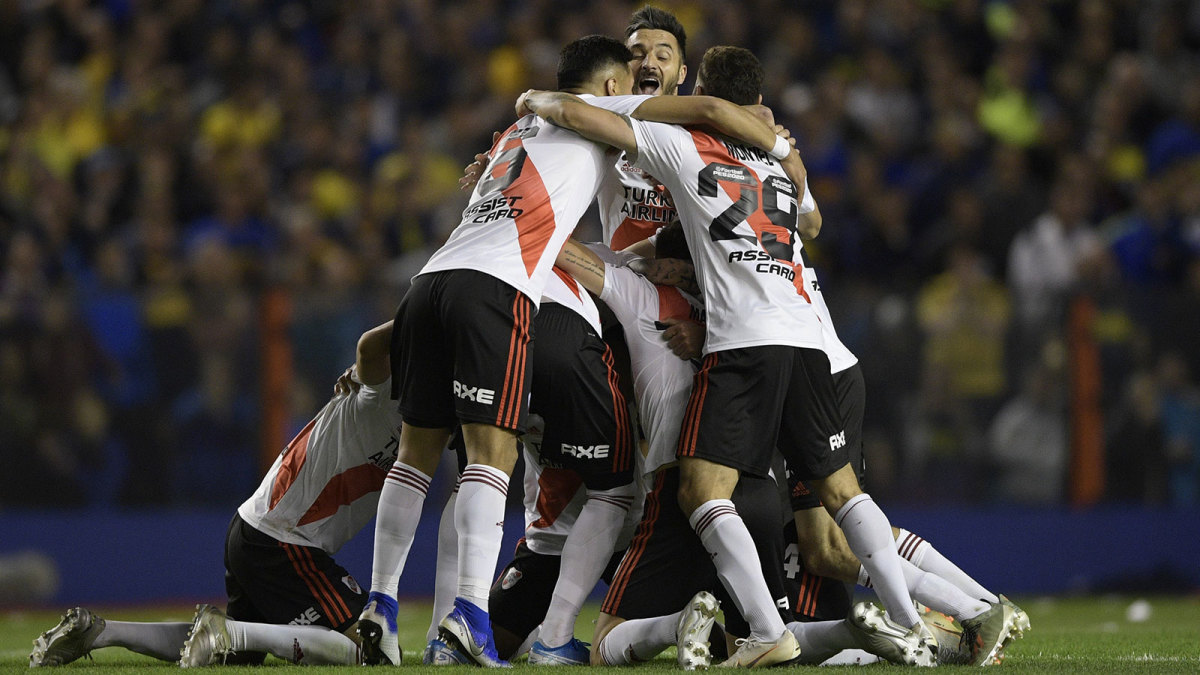Copa Libertadores Survives Boca-River Rematch, but Final Flashpoint Awaits Again
BUENOS AIRES, Argentina – Kickoff in the second leg of the Copa Libertadores Superclasico was delayed again this year–but only by 14 minutes.
Compared to events last year, when the second leg of the final between River Plate and Boca Juniors had to be postponed by a month and shifted from Buenos Aires to Madrid after an attack on the Boca team bus outside El Monumental, a quarter of an hour of frustration while men with leaf-blowers attempted to clear the pitch of confetti was nothing.
The result, though, was the same: victory for River Plate, which goes on to face either Flamengo or Gremio in the Nov. 23 final.
Perhaps being a semifinal rather than a final, this was never going to have quite the edge of last year. Perhaps the fact that River had won the first leg 2-0 dampened expectations. La Bombonera is a passionate and inspiring place, but in their heart of hearts most Boca fans must have known that it was extremely unlikely they could overturn a two-goal deficit against a team as canny as Marcelo Gallardo’s River. And perhaps, give them their due, the security was tighter this year: the River coach approached la Bombonera flanked by outriders and monitored by drones.
For CONMEBOL, that is a relief, one problem safely negotiated. The next issue is where to stage the finale. Last year, on the eve of the scheduled second leg of the final, Alejandro Dominguez, the president of CONMEBOL, explained the decision to move to a one-off from the two-legged final, which had been the format since the Libertadores launched in 1960, as necessary for marketing the competition. The tournament, he said, needs its showpiece occasion.
And perhaps he’s right. But even before recent events in Chile it was impossible not to wonder with a certain dread of what might have unfolded had last year’s final been played in Santiago, where this year’s is scheduled, leaving Boca and River fans to cross the continent, whether by land or air, placing an extraordinary strain on security services. As it is, after a week of demonstrations that have led to the imposition of a state of emergency, there are major doubts that the final can be staged in Santiago, where a 7 p.m. curfew has been imposed and there are soldiers on the streets.
Even if the situation calms between now and then, the symbolism of the Estadio Nacional can have escaped nobody. In the aftermath of the coup that brought Augusto Pinochet to power in 1973, the stadium was used as a detention and torture center. A section of seating behind one of the goals, Escotilla 8, is left permanently empty in memory of those who died there.
Given the current dynamic, any major game played at the stadium would inevitably become a locus for dissent. There remains potential, despite CONMEBOL's recent statement, that the final will be moved as Dominguez, again, would be forced to find a venue on short notice.
The Superclasico semifinal itself struggled to live up to the atmosphere and was largely without incident. Boca had the bulk of the play but struggled, as it has all season, for creativity, its only real chances coming from set plays.
River has become a side very adept at handling such situations, but Gallardo was probably a little frustrated at how frequently his team committed fouls in wide areas.
Eduardo Salvio did have the ball in the net at one point only for the goal to be ruled out for a handball, Franco Armani made a sharp tip-over as Enzo Perez sliced a clearance towards his own goal–and that was pretty much it until 19-year-old Venezuelan substitute Jan Hurtado poked the ball home from almost on the goal-line following another set play with 10 minutes remaining.
The roar was extraordinary, and briefly la Bombonera shook again, but River managed the rest of the game calmly, Boca never quite able, as it hadn’t been all night, to generate the sort of sustained pressure that might have forced an equalizer.
This was Gallardo’s eighth game as a manager at La Bombonera. He had lost only one of the previous seven, and although this was technically a defeat on the night, it was a tie his side had under control from the moment it took the lead through a seventh-minute Rafael Borre penalty in the first leg. He now stands just one game from becoming only the third coach, alongside Osvaldo Zubeldia (three) and Carlos Bianchi (four) to have won more than two Libertadores titles. At only 43, that would be a remarkable achievement.
For CONMEBOL, meanwhile, as one flashpoint is negotiated, another immediately lurks.







